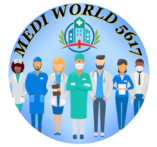EMERGENCY DOCTORS
Emergency department (ED) doctors, also known as emergency medicine physicians, specialize in providing acute care to patients with urgent medical conditions. Here’s a step-by-step guide to becoming an emergency department doctor in India:
1. Complete Higher Secondary Education (10+2)
- Stream: Science (Physics, Chemistry, and Biology).
- Goal: Achieve a high percentage (preferably above 80%) to qualify for competitive medical entrance exams.
2. Appear for NEET (National Eligibility cum Entrance Test)
- Mandatory Exam: NEET is required for admission to an MBBS program in India.
- Preparation: Focus on the NEET syllabus, which covers Physics, Chemistry, and Biology.
3. Pursue MBBS
- Duration: 5.5 years (4.5 years of academic study + 1 year of mandatory internship).
- Colleges: Secure admission in a recognized medical college.
- During the internship, seek rotations in emergency medicine to gain early exposure to the field.
4. Postgraduate Specialization in Emergency Medicine
After completing MBBS, you can specialize in emergency medicine through:
- MD Emergency Medicine: 3-year postgraduate degree.
- DNB Emergency Medicine: Offered by the National Board of Examinations, equivalent to an MD.
- Fellowships/Diplomas: Shorter programs, such as a Postgraduate Diploma in Emergency Medicine (PGDEM).
Entrance Exams for PG:
- NEET-PG (for MD/DNB programs).
- INI-CET (for AIIMS and other premier institutes).
5. Gain Experience in Emergency Care
- Work in emergency departments of hospitals or trauma centers.
- Develop skills in managing critically ill patients, resuscitation, and handling medical emergencies such as strokes, heart attacks, and accidents.
6. Optional: Subspecialization or Fellowships
- Pursue fellowships in areas like:
- Trauma Care
- Pediatric Emergency Medicine
- Critical Care Medicine
- Disaster Medicine
7. Register with the Medical Council
- After your PG, register with the National Medical Commission (NMC) or your state medical council to practice.
8. Stay Updated and Pursue Continuous Education
- Emergency medicine is dynamic. Participate in workshops, CME programs, and conferences.
- Acquire certifications like Advanced Cardiac Life Support (ACLS), Basic Life Support (BLS), and Pediatric Advanced Life Support (PALS).
Skills Required for ED Doctors:
- Quick decision-making.
- Ability to work under pressure.
- Strong communication and teamwork.
- Proficiency in performing emergency procedures like intubation, central line insertion, and trauma care.
Emergency department doctors play a crucial role in saving lives, offering fast-paced and highly rewarding careers!
